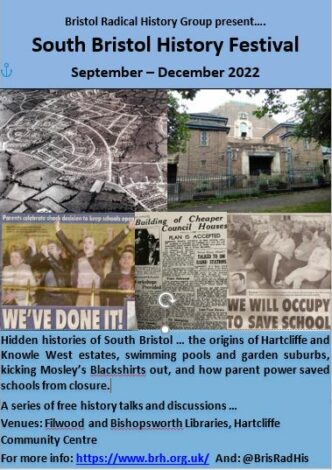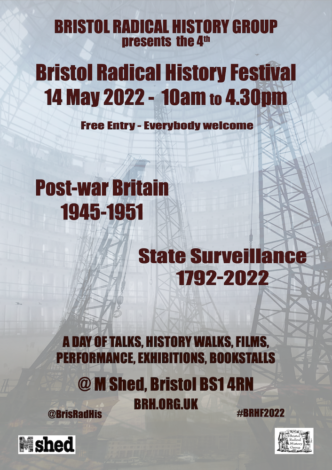This talk is based on a community oral history project, that in 2014, explored the lived history of local people who worked in the tobacco factories in Bedminster and Ashton. It offers an understanding of the social fabric of the Bedminster area, and the economic forces which have shaped our community. Helen will provide an overview of the manufacturing processes and how they changed over time; and an insight into what it was like for the workers: recruitment, working conditions, […]
 Not In An Event Series
Not In An Event Series
The Red Lodge Museum, Park Row, Bristol BS1 5LJ. Booking details here. Bristol Radical History Group member Mark Steeds, author of Cry Freedom, Cry Seven Stars and co-author of From Wulfstan to Colston, is giving a talk animated by archive poetry readings to tell the international story of the movement towards abolition during the eighteenth and nineteenth centuries. The lecture will begin with some history on African agency, starting with Nanny of the Maroons and followed by the 1736 […]
During the summer of 1946, thousands of British families took the law into their own hands to temporarily solve their housing problems by "requisitioning" empty military camps. This mass-squatting movement was rapid, spontaneous and entirely working-class in character. While it was often driven at ground level by women, the movement soon developed a formal leadership structure dominated by ex-servicemen who had served as NCOs and warrant officers. Bristol, with particularly acute housing […]
Here is the history of one Ukraine town, a microcosm of Russia, before its independence in 1991. Hughesovka, (later Stalino and Donestk) was a mining and steel town founded in the 1870s by Welsh entrepreneur John Hughes and seventy Welsh workers. This three part TV documentary directed by Colin Thomas and presented by Gwyn Williams and first broadcast in 1991 as a series of 30 minute programmes on BBC2. This documentary won the Best Documentary BAFTA Cymru, 1991 award. Watch a trailer for […]
The arrival of the Empire Windrush, which docked in Tilbury in June 1948, bringing 492 migrants from Jamaica, Trinidad and Tobago and other islands was part of the large scale migration of British Commonwealth citizens from the Caribbean that lasted until the 1962 Commonwealth Immigration Act instituted racist controls on their entry to the UK. The Empire Windrush and the 'Windrush generation', as they have been labelled, particularly since the scandal exposed in 2018, are now becoming part of […]
Our panel of speakers will address the scandal of the Spycops, the hitherto secret operations of undercover cops spying inside labour and social movements since 1968. Since the scandal became public knowledge in late 2010 with the exposure of Mark Kennedy, activists have traced and identified numerous #spycops along with their true and false identities. They have exposed some of their law-breaking activities; internal cover-ups; and coercion of numerous innocent, mainly women activists, into […]
We are pleased to host this exhibition at the BRHFestival 2022 on 14th May at Mshed. You can view the exhibition from 10am to 4pm, at the Level 2 foyer, inside Mshed. Talk - 2pm at the Level 2 Foyer, Sue Tate, a trustee from the Feminist Archive South, will give a talk about the exhibition, and answer any questions. About the exhibition: Politics and Protest is a dynamic, colourful and inspiring exhibition of 70+ posters selected from Feminist Archive South's collection of over 1000. It was […]
Black Power in Britain started in 1967, reached its apogee in 1971 and was in terminal decline by the mid-1970s. It was an expression of frustration, anger and – most importantly – resistance to the individual, institutional and state racism experienced by the postwar generation of black immigrants to Britain. The British state took the threat of Black Power very seriously, both at home and across the Commonwealth. When an international conference on Black Power took place in British […]
Individual Labour MPs such as Sidney Silverman were significant to campaigning for abolition of the death penalty in Britain and the Labour Party was more hospitable to the idea of abolition than the Conservatives. Nevertheless, despite passing the reformist Criminal Justice Act in 1948 the Labour Government was opposed to abolishing the death penalty, which did not happen in Britain until 1965. This talk will explore why the death penalty was not abolished in 1948. It will also examine how […]
Biographical documentary on Wally Hope of the tribe of Wallies who founded the Stonehenge Free Festivals in the 1970s. His is a tale of mystical visions, pharmaceutically induced nightmares, high court high jinx, pitch battles with the police and of possible conspiracy and intrigue. Narrated by Mark Savage and featuring Mark Stevenson, James Joel Dann, and Christopher Terry (62 mins). Followed by Q&A with Wally Dean. Watch the trailer below:


